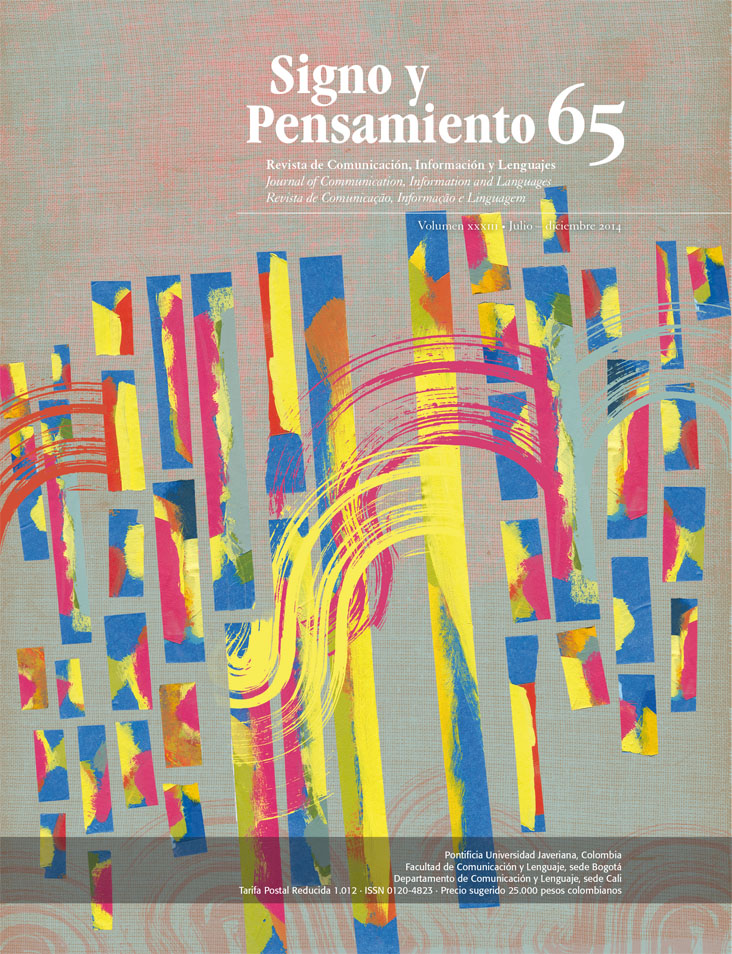Abstract
The aim of this paper is to present the organization and implementation of an immersion course in Spanish as a foreign language (SFL) from the Royal Melbourne Institute of Technology (RMIT) of Australia, and the Pontificia Universidad Javeriana (PUJ), Bogota, Colombia. The course was conducted over two weeks in November 2012, and 10 Australian students participated. We present the experience and its results, among which we highlight the improvement in communicative competences, as well as cultural and intercultural competences of students, especially for having worked aspects intrinsically related such as language and culture. It is concluded that this type of courses allow a greater linguistic development and an invaluable cultural and intercultural learning for students that are in the acquisition process of the so called intercultural communicative competence.
Agray, N. (2010). Integración entre lengua y cultura. Un dilema central en la enseñanza de lenguas. Revista Innovación y Ciencia, V (XVII), 29-38.
Bakalis, S., & Joiner, T. A. (2004). Participation in tertiary study abroad programs: The role of personality. The International Journal of Educational Management, 18(5), 286-291.
Brecht, R. D., Davidson, D. E., & Ginsberg, R. B. (1993). Predictors of foreign language gain during study abroad. NFLC occasional papers. Washington: National Foreign Language Center.
Collentine, J., & Freed, B. F. (2004). Learning context and its effects on second language acquisition. Introduction. Studies in Second Language Acquisition, 26(2), 153-171.
DeLoach, S., Saliba, L., Smith, V., & Tiemann, T. (2003). Developing a global mindset through short-term study abroad: A group discussion approach. Journal of Teaching in International Business, 15(1), 37-59.
Douglas, C., & Jones-Rikkers, C. G. (2001). Study abroad programs and American student worldmindedness: An empirical analysis. Journal of Teaching in International Business, 13(1), 55-66.
Fantini, A. (2000). A Central Concern: Developing Intercultural Competence. Recuperado de http://www.sit.edu/publications/docs/ competence.pdf.
García, J., & Bejarano, L. G. (2008). Adquisición de una segunda lengua en estancias cortas en el extranjero: análisis actitudinal. Didáctica. Lengua y Literatura, 20, 117-134.
Gardner, M. (2010). Plan estratégico de RMIT 2011-2015: Where Bold Hopes Can Be Realised. Recuperado de http://www.rmit.edu.au/ about/strategy.
Gudykunst, W. B. (2004). Bridging differences: effective intergroup communication (4th ed.). Thousand Oaks, CA: Sage Publications.
Hall, S. (1997). Representation. Cultural representations as signifying practice. Thousand Oaks, CA: Sage Publications.
Jackson, J. (2010). Intercultural journeys. From study to residence abroad. New York: Palgrave Macmillan.
Kitsantas, A. (2004). Studying abroad: The role of college students’ goals on the development of cross-cultural skills and global understanding. College Student Journal, 38(3), 441-453.
Kitsantas, A., & Meyers, J. (2001). Studying abroad: does it enhance college student cross- cultural awareness? (Educational Resources Information Center No. ED 456 648).
Levin, D. M. (2001). Language learners´ sociocultural interaction in a study abroad context. PhD thesis, Indiana University. Dissertation Abstract International. 62 (2).
Lustig, M. W., & Koester, J. (2006). Intercultural competence: interpersonal communication across cultures (5th ed.). New York: Longman.
Pontificia Universidad Javeriana. (2009). Acuerdo Nº 448. Políticas para la Internacionalización de la Universidad. Recuperado de http://pujportal.javeriana.edu.co/portal/page/portal/portal_version_2009_2010/internacionales/ resources_v1/acuerdo%20_448_de_ 2007.pdf
Universidad de Nebrija. (1998). Curso de metodología en la enseñanza de español como lengua extranjera. El componente cultural en los diferentes enfoques. Madrid: mimeo.
This journal is registered under a Creative Commons Attribution 4.0 International Public License. Thus, this work may be reproduced, distributed, and publicly shared in digital format, as long as the names of the authors and Pontificia Universidad Javeriana are acknowledged. Others are allowed to quote, adapt, transform, auto-archive, republish, and create based on this material, for any purpose (even commercial ones), provided the authorship is duly acknowledged, a link to the original work is provided, and it is specified if changes have been made. Pontificia Universidad Javeriana does not hold the rights of published works and the authors are solely responsible for the contents of their works; they keep the moral, intellectual, privacy, and publicity rights.
Approving the intervention of the work (review, copy-editing, translation, layout) and the following outreach, are granted through an use license and not through an assignment of rights. This means the journal and Pontificia Universidad Javeriana cannot be held responsible for any ethical malpractice by the authors. As a consequence of the protection granted by the use license, the journal is not required to publish recantations or modify information already published, unless the errata stems from the editorial management process. Publishing contents in this journal does not generate royalties for contributors.


